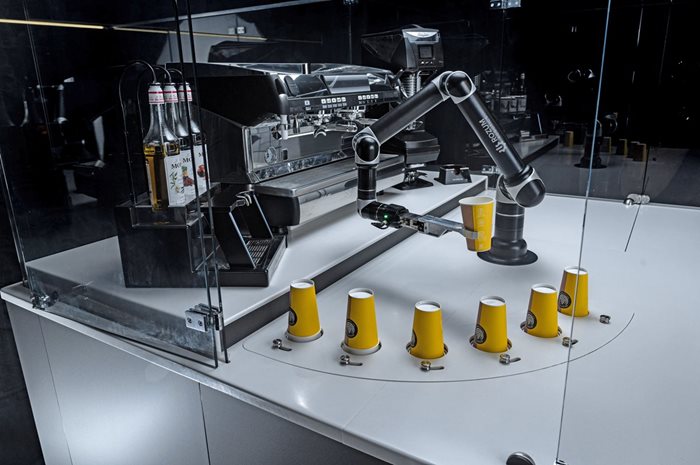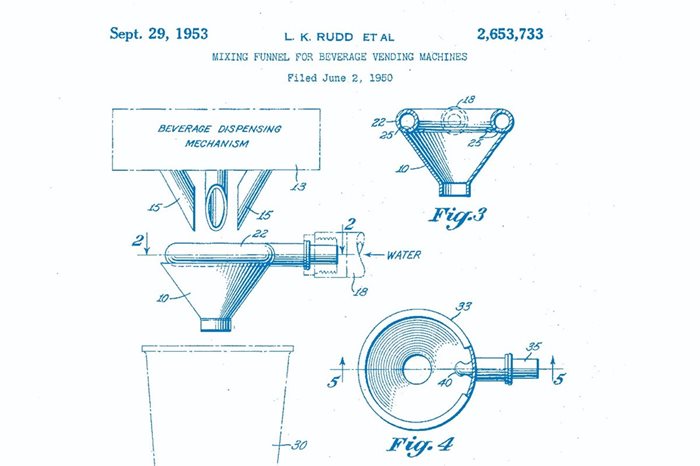With sophisticated technology providing benefits across quality, convenience and efficiency, a new three-part series explores how a new generation of automated coffee concepts could become important tools delivering quality hospitality at scale in the post-pandemic world
 The future is now? Rozum Café’s robotic barista concept in action | Photo credit: Rozum Café
The future is now? Rozum Café’s robotic barista concept in action | Photo credit: Rozum Café
In 1944 US Airforce servicemen Lloyd K. Rudd and K. Cyrus Melikian couldn’t get a cup of coffee during a late-night post exchange. Reluctantly settling for a cold soda from a nearby vending machine, the pair wondered why hot beverages couldn’t be dispensed in the same automated fashion.
The Rudd-Melikian Company they later founded is credited with inventing the first modern coffee vending machine. Patented in 1947, the ‘Kwik Kafe’ took five seconds to prepare a cup of instant coffee and by 1955 there were more than 60,000 units in operation across the US.
Automated coffee has come a long way since then, but the desire of Rudd and Melikian for an after-hours cup of coffee on the road endures to this day. Most of us have, however, endured a sub-par beverage at a far-flung transport hub or waiting room, with quality expectations frequently sacrificed at the altar of convenience when it comes to automated coffee.
But increasingly, super-automatic technology is elevating both quality and choice across vended and staffed coffee propositions – and giving baristas a run for their money when it comes to quality, speed and consistency. With staff turnover typically high in the hospitality industry, super-automatic machines can also significantly reduce human error caused by insufficient staff training and help deliver product consistency across large estates.
It’s no wonder the global market for automated coffee is thriving. In the UK alone, World Coffee Portal data shows the premium self-serve vending market has more than doubled in size to more than 14,600 units over the last five years.
"Automated coffee machines give businesses the opportunity to offer quality coffee consistently without needing to train busy staff with the dedicated barista skills"
– Beth Langley, Out-of-Home Director at Nespresso Professional
In Italy, world-renowned espresso machine manufacturer Cimbali Group plans to increase super-automatics from 25% of its business today to at least 40% within three years. “The super-automatic market is growing faster than the traditional market. It is less mature and therefore has much higher growth potential,” says Enrico Bracesco, Chief Commercial Officer, Gruppo Cimbali.
Eyeing huge potential for super-automatic technology in the global market, in May 2021 appliance manufacturer and coffee equipment specialist, De’Longhi Group completed its $164m acquisition of Swiss super-automatic espresso machine maker, Eversys.
“As more customers want to enjoy a good quality cup of coffee when they go out to restaurants, pubs or bars, automated coffee machines give businesses the opportunity to offer quality coffee consistently without needing to train busy staff with the dedicated barista skills,” says Beth Langley, Out-of-Home (OOH) Director at Nespresso Professional.
“Alongside this, because of the pandemic and the focus on health and safety, I think we’ll see an increase in hospitality businesses considering automated coffee machines as an option for their business,” she adds.
Lem Butler, five-time barista champion and Co-founder of Black & White Coffee Roasters, agrees super-automatic technology can generate new business opportunities for hospitality brands seeking to offer higher quality but not specialise in coffee.
“There is a need for that consistency in restaurants and bakeries that want to add a coffee programme but don’t have the time to dive into training people to run an espresso machine. A super-automatic is perfect for them,” he says.

A 1953 diagram patent for mixing devices for liquids inside the dispensing nozzle of the Kwik Kafe coffee machine filed by Lloyd K. Rudd and K. Cyrus Melikian
Super-automatic coffee machines are also increasingly being deployed by giants of the coffee industry. Global brands, including Starbucks, Costa Coffee, Lavazza and Tchibo – to name but a few – have all invested significant resources in automated and self-serve coffee concepts in recent years – and Covid-19 looks set to accelerate this trend.
“The virus helped drive automation forward, but it didn’t create the trend. The dynamic is here to stay,” says Eugene Kovalenko, Chief Commercial Officer at Rozum Café, a customisable robotic coffee concept founded in Belarus in 2018 with eight units in operation across Belarus, Russia and Saudi Arabia. By 2022, the brand aspires to operate more than 50 units in MENA region countries and more than 30 in the US.
The robotic barista concept takes two minutes to prepare the most complex coffee and syrup beverage on its integrated menu. And, while the technology doesn’t make individual beverages quicker than a human barista, Kovalenko says the technology’s efficiencies become apparent in the long term.
“In the long run, a robotic barista is far more efficient than a human,” he says. “The Rozum Café can whip up to 30 beverages in an hour and more than 400 in a 12-hour shift. In general, the biggest expenses for a regular coffee bar owner is related to staff costs.” he adds.
In part two, we discover the future of data driven coffee and how this can improve operational efficiency in hospitality businesses.
This article was first published in Issue 7 of 5THWAVE magazine.
Subscribe to 5THWAVE to receive each edition in print and digitally or sign up to our newsletter and be the first to read the latest articles and updates on World Coffee Portal research
